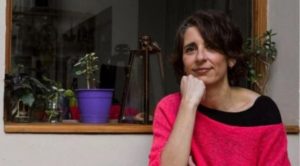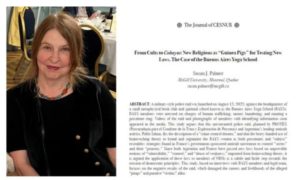Photo: The prosecutors in charge of PROTEX, María Alejandra Mángano and Marcelo Colombo. From Facebook.
ARGENTINA: PROTEX dangerous ideology. How to fabricate “victims of prostitution”
A book by an Argentinian prosecutor criticizes the theory that “all” sex workers are coerced to prostitution. PROTEX goes one step further, seeing prostitutes where there are none.
by Willy Fautré
 Bitter Winter (28.09.20230) – In its frantic quest for victims of sexual exploitation, PROTEX, an Argentinian state agency fighting trafficking in human beings and criminal gangs exploiting prostitutes, has also fabricated imaginary prostitutes and hereby made real victims by alerting the media when it carried out a spectacular armed SWAT crackdown in August 2022 on the Buenos Aires Yoga School (BAYS), a philosophical belief group allegedly running a prostitution ring, and on some fifty other places in Buenos Aires.
Bitter Winter (28.09.20230) – In its frantic quest for victims of sexual exploitation, PROTEX, an Argentinian state agency fighting trafficking in human beings and criminal gangs exploiting prostitutes, has also fabricated imaginary prostitutes and hereby made real victims by alerting the media when it carried out a spectacular armed SWAT crackdown in August 2022 on the Buenos Aires Yoga School (BAYS), a philosophical belief group allegedly running a prostitution ring, and on some fifty other places in Buenos Aires.
All in all, arrest warrants were issued against 19 persons, 10 men and 9 women, allegedly running a criminal ring. They were all imprisoned and submitted to a very harsh jail regime for pre-detention periods ranging from 18 to 84 days. In two cases, the Court of Appeals revoked the indictment for being unfounded. The others are free and are waiting for the next round.
Fabricated prostitutes
Five women older than fifty, three in their forties and one in her mid-thirties are on the one hand suing two prosecutors of PROTEX on unfounded claims of their being victims of sexual exploitation in the framework of a yoga school. On the other hand, they are real victims of PROTEX as they now publicly bear the stigma of prostitute, which they strongly deny ever having been. Although prostitution is not illegal in Argentina, the damage is huge in their personal, family, and professional life.
Those fabricated prostitutes were recently interviewed in Buenos Aires by Susan Palmer, an Affiliate Professor in the Religions and Cultures Department at Concordia University in Montreal (Canada) and Director of the Children in Sectarian Religions and State Control Project at McGill University (Canada), supported by the Social Sciences and the Humanities Research Council of Canada (SSHRC). These women are not from a vulnerable social class and have not been trafficked into Argentina. They belong to the middle class and had a job. During the interviews they again strongly denied having been involved in prostitution. As of today, PROTEX has not provided any evidence of prostitution, and consequently of any form of exploitation in this framework.
In a 22-page well-documented report published in the July-August issue of The Journal of CESNUR, Susan Palmer highlighted the various facets of the destructive effect of PROTEX operation in the lives of imaginary prostitutes and their imaginary pimps in BAYS.
The arrested persons were accused of criminal association, human trafficking, sexual exploitation and money laundering on the basis of Law No 26.842 on Prevention and Punishment of Human Trafficking and Assistance to Victims.
The legislation against sexual exploitation
Until 2012, this sort of criminal activity was punishable by Law 26.364 but on 19 December 2012, this law was amended in such a way that it opened the door to controversial interpretation and implementation. It is now identified as Law 26.842.
The financial exploitation of prostitution by third parties must undoubtedly be prosecuted in courts as the victims are most often poor local women, female refugees, or women imported for prostitution purposes. Some accept to be considered as victims. Others do not. In this second category, a number of women state that prostitution is their choice because they fear reprisals from their pimp or the mafia ring on which they depend. They may therefore be considered as victims as well by the courts in charge of an investigation, despite their denials.
Other independent prostitutes who are not linked to any network also declare that it is a real life choice and that they are not victims. It is at this point that the interpretation and the application of Law 26.842 become very problematic because the legal system considers them to be victims, despite their denials.
Last but not least, other women who have not been involved in prostitution are held to be victims, against their will, by the judicial system because of an investigation into an organization suspected of sexual exploitation. This is the case of the nine women having attended the Buenos Aires Yoga School who vehemently deny any prostitution activity in their lives.
Abolitionism, a questionable “feminist” concept
Two political standpoints, abolitionism and accommodation, are at loggerheads on the prostitution issue.
With regard to legislation on prostitution, abolitionism is a school of thought that aims to abolish prostitution and rejects all forms of accommodation that authorize it. The supporters of both approaches agree on the decriminalization of prostitution, but abolitionism currently considers “all” prostitutes to be victims of a system that exploits them due to their vulnerability. This viewpoint about the victims and their situation of vulnerability has been adopted by PROTEX.
The original aim of the abolitionist movement was to oppose the accommodation and regulation of prostitution, which among other things imposed medical and police controls on prostitutes.
The accommodation and regulation of prostitution in fact amounted to the establishment of prostitution and the officialisation of procuring. As the neo-abolitionist movement, with a more radicalized vision than that of the original abolitionism, asserted that the most intolerable forms of violence accompanying trafficking and forced prostitution are linked to the impunity of procurers, its aim is to prohibit all forms of exploitation of the prostitution wherever it is susceptible to take place.
The next step was to enlarge the scope of “irregularly authorized” places where prostitution could be exploited by criminal rings, such as “saunas,” “pubs,” “whisky clubs,” “night clubs,” “yoga clubs,” etc., which were said to be promoted with impunity in the media and in the public space. The Public Prosecutor’s Office encouraged the adoption of measures aimed at uncovering the veil of these “houses of tolerance,” which are the destination of the trafficking process for the purpose of sexual exploitation, and which enjoy an allegedly spurious and inappropriate legal recognition.
This approach provided an open door to suspicions of sexual exploitation in spiritual groups such as BAYS.
The drifting of PROTEX about the victimization issue
The controversial implementation of the controversial Law 26.842 along with its dissemination in and by the intellectual elite and the judiciary in Argentina was criticized by Marisa S. Tarantino in a book she published in 2021 under the title “Ni víctimas ni criminales: trabajadores sexuales. Una crítica feminista a las políticas contra la trata de personas y la prostitución” (Neither Victims nor Criminals: Sex Workers. A Feminist Critique of Anti-Trafficking and Anti-Prostitution Policies; Buenos Aires: Fondo de Cultura Económica de Argentina).
Marisa Tarantino is Legal Prosecutor of the Attorney General’s Office of the Nation and was the former Secretary of the Federal Criminal and Correctional Prosecutor’s Office No. 2 of the Federal Capital. She is a specialist in Justice Administration (Universidad de Buenos Aires/ Buenos Aires University) and Criminal Law (Universidad de Palermo/ Palermo University). As she has participated in workshops organized by PROTEX, her opinion is all the more valuable. In short, these are a few of her findings:
– “UFASE-PROTEX—which had been one of the agencies strongly linked to the International Organization for Migration to address this issue—was especially dedicated to the task of disseminating the neo-abolitionist perspective, presenting it as the correct paradigm for dealing with cases of trafficking and sexual exploitation. This was reflected in the organization of multiple training courses and workshops, dissemination materials, ‘best practice protocols,’ and even in academic production. All this exerted a strong influence in various institutional spheres throughout the country” (p. 194).
– “Thus, the incorporation of this particular gender perspective, built from the main neo-abolitionist postulates, made it possible to (re)interpret the different forms of organization and exchange of sexual services in terms of criminal conflict and, more precisely, in terms of trafficking” (p. 195).
This is the context generated by the 2012 amendments to the law on trafficking and the exploitation of prostitution by criminal rings and PROTEX’ endorsement of the neo-abolitionist political model that was (mis)used to justify the crackdown on BAYS.
Apart from the political model, PROTEX found an ally in the person of the anti-cultist Pablo Salum who shot all his arrows at non-traditional religious or belief groups in Argentina, including a respected international Evangelical NGO whose 38 centers were recently raided on alleged charges of trafficking.
The diabolical triangle in the BAYS case: a political standpoint, the fabrication of false victims, the PROTEX and Salum couple
BAYS is the victim of a political model, its judicial architect PROTEX, and the anti-cultist Pablo Salum.
Salum, who had lived with relatives practicing yoga at BAYS until he was a teenager, arrived with an “added value” in the debate. He accused BAYS of being a “cult,” controlling and brainwashing women to involve them in prostitution for the purpose of financing itself. His position was comforted by a tidal wave of media reports, which reproduced his accusations without any check, This is how BAYS became “the horror cult” in Argentina and abroad.
Several reports by foreign researchers have however shown that Salum only spread fantasies and lies about BAYS and new religious movements to attract the attention of the media on his own person.
Some leaders of PROTEX unwisely started befriending Salum, in whom they saw an opportunity to investigate and prosecute new groups on the basis of charges of human trafficking and exploitation of prostitution.
On the one hand, according to PROTEX, people used for prostitution are all real victims because of the exploitation of their vulnerabilities, even if they fiercely deny it. On the other hand, according to Salum, cults achieve the same result by brainwashing their members and exploiting their weaknesses. The abuse of vulnerability according to PROTEX and the abuse of weakness according to the anti-cultist Salum thus lead to the same result: the creation of so-called victims who are unaware of being victims and deny it.
This explains the trap into which BAYS and the nine women described by PROTEX as unaware victims of prostitution by a criminal network have fallen.
How to get out of this trap? Argentina remains a democracy and justice is the main way out. The Christian group “Cómo vivir por fe” won its case against PROTEX in November 2022 after a raid instigated by Pablo Salum and accusations of exploitation and organ trafficking. The court criticized Salum for having “coached” and manipulated the main witness.
In the case of BAYS, brainwashing is a fantasy denounced as a non-existent concept by scholars in religious studies. Concerning the nine female plaintiffs the courts will have to recognize that there is no evidence of sale of sexual services.
The machinations of PROTEX and Co. were recently denounced by CAP/ Liberté de Conscience, an NGO with ECOSOC status, at the 53rd session of the UN Human Rights Council in Geneva.
PROTEX and the judiciary in Argentina would do well to heed this warning shot before losing face in front of the international human rights community when the ghost of prostitution vanishes in the BAYS case.
Photo above : Marisa S. Tarantino. From Twitter.

Photo: Canadian scholar Susan Palmer and her study of the BAYS alleged “victims.”
